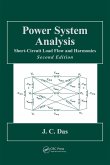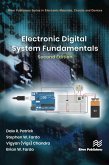Pedro Ponce, Arturo Molina, Omar Mata, Luis Ibarra, Brian Maccleery
Power System Fundamentals (eBook, PDF)
57,95 €
57,95 €
inkl. MwSt.
Sofort per Download lieferbar

29 °P sammeln
57,95 €
Als Download kaufen

57,95 €
inkl. MwSt.
Sofort per Download lieferbar

29 °P sammeln
Jetzt verschenken
Alle Infos zum eBook verschenken
57,95 €
inkl. MwSt.
Sofort per Download lieferbar
Alle Infos zum eBook verschenken

29 °P sammeln
Pedro Ponce, Arturo Molina, Omar Mata, Luis Ibarra, Brian Maccleery
Power System Fundamentals (eBook, PDF)
- Format: PDF
- Merkliste
- Auf die Merkliste
- Bewerten Bewerten
- Teilen
- Produkt teilen
- Produkterinnerung
- Produkterinnerung

Bitte loggen Sie sich zunächst in Ihr Kundenkonto ein oder registrieren Sie sich bei
bücher.de, um das eBook-Abo tolino select nutzen zu können.
Hier können Sie sich einloggen
Hier können Sie sich einloggen
Sie sind bereits eingeloggt. Klicken Sie auf 2. tolino select Abo, um fortzufahren.

Bitte loggen Sie sich zunächst in Ihr Kundenkonto ein oder registrieren Sie sich bei bücher.de, um das eBook-Abo tolino select nutzen zu können.
This book covers the fundamentals of power systems, which are the pillars for smart grids, with a focus on defining the smart grid with theoretical and experimental electrical concepts. It begins with the topic of electric circuits, which are the basic systems in smart grids, and finishes with a complete smart grid concept.
- Geräte: PC
- mit Kopierschutz
- eBook Hilfe
- Größe: 95.5MB
Andere Kunden interessierten sich auch für
![Fundamentals and Source Characteristics of Renewable Energy Systems (eBook, PDF) Fundamentals and Source Characteristics of Renewable Energy Systems (eBook, PDF)]() Radian BeluFundamentals and Source Characteristics of Renewable Energy Systems (eBook, PDF)48,95 €
Radian BeluFundamentals and Source Characteristics of Renewable Energy Systems (eBook, PDF)48,95 €![Fundamentals of Robotics (eBook, PDF) Fundamentals of Robotics (eBook, PDF)]() David ArdayfioFundamentals of Robotics (eBook, PDF)65,95 €
David ArdayfioFundamentals of Robotics (eBook, PDF)65,95 €![Power System Analysis (eBook, PDF) Power System Analysis (eBook, PDF)]() J. C. DasPower System Analysis (eBook, PDF)102,95 €
J. C. DasPower System Analysis (eBook, PDF)102,95 €![Power System Economic and Market Operations (eBook, PDF) Power System Economic and Market Operations (eBook, PDF)]() Jin ZhongPower System Economic and Market Operations (eBook, PDF)52,95 €
Jin ZhongPower System Economic and Market Operations (eBook, PDF)52,95 €![Infrastructure Asset Management with Power System Applications (eBook, PDF) Infrastructure Asset Management with Power System Applications (eBook, PDF)]() Lina Bertling TjernbergInfrastructure Asset Management with Power System Applications (eBook, PDF)52,95 €
Lina Bertling TjernbergInfrastructure Asset Management with Power System Applications (eBook, PDF)52,95 €![Power System Transients (eBook, PDF) Power System Transients (eBook, PDF)]() Akihiro AmetaniPower System Transients (eBook, PDF)84,95 €
Akihiro AmetaniPower System Transients (eBook, PDF)84,95 €![Electronic Digital System Fundamentals (eBook, PDF) Electronic Digital System Fundamentals (eBook, PDF)]() Dale R. PatrickElectronic Digital System Fundamentals (eBook, PDF)137,95 €
Dale R. PatrickElectronic Digital System Fundamentals (eBook, PDF)137,95 €-
-
-
This book covers the fundamentals of power systems, which are the pillars for smart grids, with a focus on defining the smart grid with theoretical and experimental electrical concepts. It begins with the topic of electric circuits, which are the basic systems in smart grids, and finishes with a complete smart grid concept.
Dieser Download kann aus rechtlichen Gründen nur mit Rechnungsadresse in A, B, BG, CY, CZ, D, DK, EW, E, FIN, F, GR, HR, H, IRL, I, LT, L, LR, M, NL, PL, P, R, S, SLO, SK ausgeliefert werden.
Produktdetails
- Produktdetails
- Verlag: Taylor & Francis eBooks
- Seitenzahl: 445
- Erscheinungstermin: 4. Dezember 2017
- Englisch
- ISBN-13: 9781351371834
- Artikelnr.: 50417471
- Verlag: Taylor & Francis eBooks
- Seitenzahl: 445
- Erscheinungstermin: 4. Dezember 2017
- Englisch
- ISBN-13: 9781351371834
- Artikelnr.: 50417471
- Herstellerkennzeichnung Die Herstellerinformationen sind derzeit nicht verfügbar.
Pedro Ponce studied engineering in automation and control and graduated in 1995. Subsequently, he completed his graduate studies, obtaining the degree of Master of Science in 1998 and Doctor of Science in 2002. He worked as a field and design engineer in several industries. He specializes in the areas of industrial automation systems, electrical machines, electric drives, power electronics, conventional and digital control, expert systems, neural networks fuzzy logic, biological artificial systems, and evolutionary systems. He is a professor and a researcher at Tecnologico de Monterrey campus Ciudad de Mexico.
Arturo Molina is a professor and researcher, as well as Vice President of Research, Postgraduate Studies and Continuing Education, at the Tecnologico de Monterrey. He has a bachelor's degree in computational systems and a master's degree in computational sciences (1990) from the Tecnologico de Monterrey, Campus Monterrey (1986), a doctorate degree in mechanics from the Technical University of Budapest (1992), and another in manufacturing systems from the Loughborough University of Technology in England (1995).
Omar Mata holds a BS degree in telecommunications and electronic systems (2010) from Tecnologico de Monterrey and the degree of Master of Science (2013) from the same institution. Since 2015, he has been the CEO and co-founder of Uberproto Technologies, which is a company specializing in the development of software and electronic technologies. He has been a research assistant and professor at the Tecnologico de Monterrey campus Ciudad de Mexico since 2011. He specializes in the areas of robotics and digital systems with interest in fuzzy logic control.
Luis M. Ibarra received the BS degree in mechatronics engineering from Tecnologico de Monterrey, Mexico City, Mexico, in 2011 and the PhD degree in intelligent control from the same institution in 2016. He is currently working as a researcher for a project headed by the Mexican Energy Secretariat (SENER) and the Mexican Science and Technology Council (CONACYT) with special focus on power electronics control. From 2012 to 2015, he was a research assistant and lecturer with the Tecnologico de Monterrey, Mexico City, Mexico. His research interests include robust and intelligent control techniques, power electronics, and renewable energies. Most of his work is centered in fuzzy logic control, robust control, and electric machinery.
Brian MacCleery helps small to medium businesses bring innovative clean energy products to market. He guides National Instruments strategic R&D and product development for embedded control and measurement with a focus on customer oriented design tools for advanced control. In his 15-year tenure at NI, MacCleery led market research, product definition, launch and growth of the successful NI CompactRIO platform and product strategy for the popular LabVIEW FPGA toolchain. MacCleery holds bachelor and master degrees in electrical and computer engineering from Virginia Tech where he now serves on the Industry Advisory Board. He completed his graduate research in power electronics and linear switched reluctance motor drives under the direction of Dr. Krishnan Ramu and led multidisciplinary teams in the development of novel magnetic levitation and propulsion vehicle systems.
Arturo Molina is a professor and researcher, as well as Vice President of Research, Postgraduate Studies and Continuing Education, at the Tecnologico de Monterrey. He has a bachelor's degree in computational systems and a master's degree in computational sciences (1990) from the Tecnologico de Monterrey, Campus Monterrey (1986), a doctorate degree in mechanics from the Technical University of Budapest (1992), and another in manufacturing systems from the Loughborough University of Technology in England (1995).
Omar Mata holds a BS degree in telecommunications and electronic systems (2010) from Tecnologico de Monterrey and the degree of Master of Science (2013) from the same institution. Since 2015, he has been the CEO and co-founder of Uberproto Technologies, which is a company specializing in the development of software and electronic technologies. He has been a research assistant and professor at the Tecnologico de Monterrey campus Ciudad de Mexico since 2011. He specializes in the areas of robotics and digital systems with interest in fuzzy logic control.
Luis M. Ibarra received the BS degree in mechatronics engineering from Tecnologico de Monterrey, Mexico City, Mexico, in 2011 and the PhD degree in intelligent control from the same institution in 2016. He is currently working as a researcher for a project headed by the Mexican Energy Secretariat (SENER) and the Mexican Science and Technology Council (CONACYT) with special focus on power electronics control. From 2012 to 2015, he was a research assistant and lecturer with the Tecnologico de Monterrey, Mexico City, Mexico. His research interests include robust and intelligent control techniques, power electronics, and renewable energies. Most of his work is centered in fuzzy logic control, robust control, and electric machinery.
Brian MacCleery helps small to medium businesses bring innovative clean energy products to market. He guides National Instruments strategic R&D and product development for embedded control and measurement with a focus on customer oriented design tools for advanced control. In his 15-year tenure at NI, MacCleery led market research, product definition, launch and growth of the successful NI CompactRIO platform and product strategy for the popular LabVIEW FPGA toolchain. MacCleery holds bachelor and master degrees in electrical and computer engineering from Virginia Tech where he now serves on the Industry Advisory Board. He completed his graduate research in power electronics and linear switched reluctance motor drives under the direction of Dr. Krishnan Ramu and led multidisciplinary teams in the development of novel magnetic levitation and propulsion vehicle systems.







